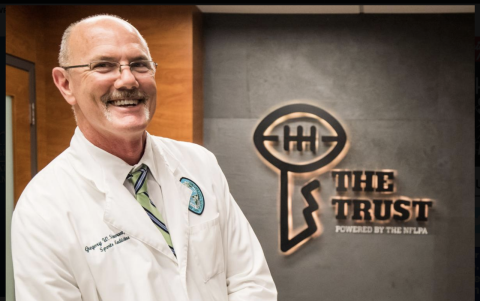Famous athletes seek this Tulane clinic after their careers and want to know, 'what was the cost?'
This story originally appeared on NOLA.com.
Build a career on inflicting and sustaining bodily violence. Then train your brain to believe the pain that comes with it is secondary to the mission.
The rigid structure around you, the only framework you’ve known since starting college, validates that belief. But the longer you last in this savage yet lucrative profession, the louder that voice in your head demands to know: What is the cost?
You can set that question aside for as long as you can. But inevitably, when the body no longer tolerates the punishment or fails to keep pace with a younger, faster and stronger generation, you must choose whether to confront it or keep living in ignorance.
“For every player, there’s a boogeyman in the closet,” said former New Orleans Saints cornerback Jabari Greer, a 10-year NFL veteran. “We have to ask ourselves: ‘Exactly how did the game damage us?’”
Today, Kerry Joseph stares down the boogeyman.
Joseph spent nearly two decades calling himself a professional football player in America, Europe and Canada. To last that long, he had to form mental and physical calluses. A harsh reality comes with this brutal game: It will pass you by if you succumb to the pain.
But no matter how hard you try to numb everything, there comes a time for reckoning. And with that, lying beneath the machismo, is the fear of learning the toll.
“We’re the tough guys. We’ve got to play hurt. We’ve got to tough it out,” Joseph said. “But in the game of life, it doesn’t work that way. I don’t want to be that person that is scared to find out.”
Joseph is one of the more than 600 former professional football players who have cycled through Tulane’s Professional Athlete Care Team (PACT) clinic since it began operations in 2013. The clinic, a cloistered facility on the fourth floor of Tulane Hospital, sees former professional athletes during an exhaustive 2½-day screening process that determines what may ail them after their playing days finish. Its purpose is to diagnose, not treat, the issues it uncovers by developing for these players a comprehensive and intimate understanding of the inner workings of their bodies and minds.
Tulane’s PACT is one of five sites around the country to host former NFL players for the Brain and Body Assessment (for players whose career ended less than 15 years ago) and the Milestone Wellness Assessment (players whose career ended more than 15 years ago) screening programs. The cost of the care is funded through the Trust, which was established by the NFL Players Association in 2013. (continued...)
Read the full story on NOLA.com

